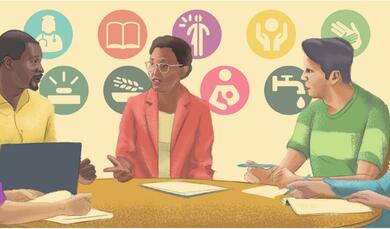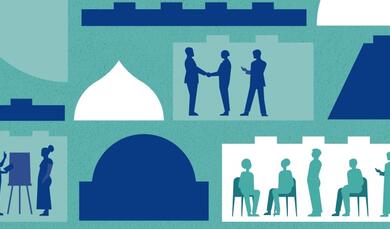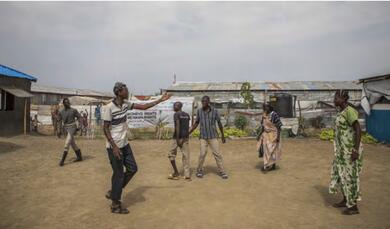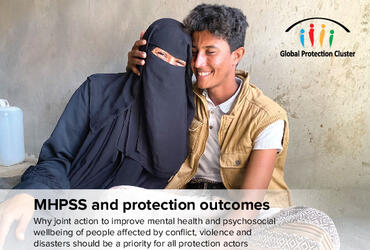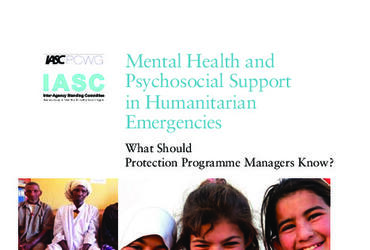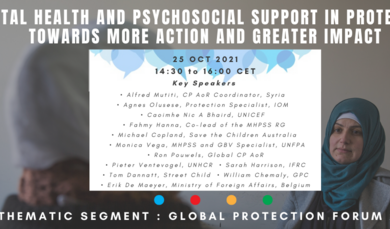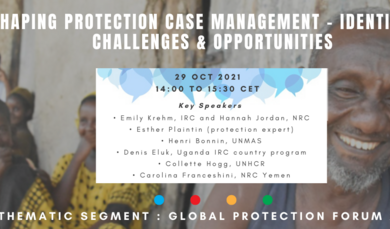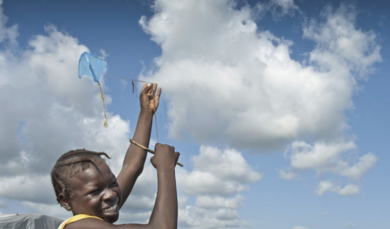Mental health and psychosocial support (MHPSS) ‘problems’ can cover a wide range of issues including social problems, emotional distress, common mental conditions (such as depression and anxiety disorders), severe mental health conditions (such as psychosis), alcohol and substance abuse, and intellectual, developmental or cognitive disabilities.
There is a bidirectional relation between MHPSS issues and protection risks.
- Conflicts, disasters and violence induce high levels of psychological distress due to direct human rights violations including torture, rape and other forms of gender-based violence, and due to losses of loved ones, homes, traditions and livelihoods.
- There can be a correlation between depression and substance abuse, particularly alcohol consumption and an increase in Intimate Partner Violence. Youth, with mental health issues, are at greater risk for abuse and exploitation. When parents suffer from depression, they are less likely to take good care of their children.
- In emergency settings, the rights of people with pre-existing mental health conditions are often violated, even more pervasively than in stable situations. Conflicts, disasters and violence increase protection risks of people with severe mental health conditions in psychiatric institutions, or who are homeless or kept locked in homes including persons with psychosocial or other disabilities.
Over the last decade, supporting people’s mental health and psychosocial wellbeing has gained increasing recognition as a necessary and important part of humanitarian response. This recognition has been largely shaped by guidance that makes clear that effective MHPSS requires a collaborative approach between multiple humanitarian disciplines. However, in practice, delivery of MHPSS in emergencies remains concentrated within health, child protection, gender-based violence and mine action programmes. A closer engagement of all protection actors and other humanitarian sectors on MHPSS, would make MHPSS more effective and the protection response more comprehensive and equitable.
The Approach
No single cluster agency or cluster is, on its own, responsible or accountable for MHPSS. It is a shared responsibility of multiple agencies and clusters.
However, there is a clear and important role for protection actors in responding to the mental health and psychosocial needs of people in need of protection.
Addressing the mental health and psychosocial consequences of conflict, violence and disasters contributes to protection by strengthening the agency of people to effectively address their protection issues. The capacity of people and families to take actions to claim their rights are negatively affected by pervasive demoralisation, feelings of depression and anxiety, memories related to past events of violence and loss, and worries about current life circumstances and the future. Moreover, addressing the mental health consequences of forced displacement can contribute to durable solutions. There is a bidirectional relation between mental health and the ability to be successful in school, job and livelihoods and including MHPSS considerations in activities for durable solutions to be more effective.
At the global level, the GPC is:
- Advocating for greater funding for MHPSS services
- Taking steps to ensure MHPSS is mainstreamed within Protection activities at the field level, including making MHPSS a standing item on the agenda of protection cluster meetings and inter-sectoral coordination meetings
- Advocating for MHPSS as a cross-cutting issue in the humanitarian response and in the humanitarian programme cycle such as in Humanitarian and Refugee Response Plans, and Humanitarian Needs Overviews
- Facilitating research on MHPSS and protection in humanitarian settings
At the field Protection Cluster level, we:
- Enable individuals, households, and communities to use effectively and healthy coping mechanisms to deal with distress
- Strive for the delivery of the Minimum Service Package for MHPSS
- Foster muti-sectoral cooperation with other sectors to maximize the impact of MHPSS effort
- Encourage Protection Areas of Responsibility (AoRs) to systematically incorporate MHPSS within their programming and actively support those who are already doing this - notably Child Protection, GBV and Mine Action.
- Improve and make access to MHPSS services more equitable to all population groups, including women, men, children, youth, older people, LGBTI persons, survivors of torture or arbitrary detention, survivors of forced disappearance and family of disappeared, male and female GBV survivors, people with disabilities, and people with substance use problems.
- Support the humanitarian response to adequately meet the MHPSS needs of at-risk groups, which frequently remain unaddressed or are referred to specialized services, which, if they exist at all, are often focused on clinical (medical) management of more severe mental health issues and have limited capacity and understanding of protection violations.
- Scale up community-based protection activities, including protection outreach and activities aimed at reducing stigma and discrimination of marginalised groups in communities (e.g., persons with disabilities including those with intellectual, developmental and cognitive disabilities) to positively impact on the well-being of affected individuals and families.
“Too often we overlook one of the most important aspects of what helps us as humans to survive. And that is our state of mind. People caught in crisis do need water, food and shelter and other material things – but they also need help to cope and recover from calamity. They need help to restore their mental wellbeing.”
Mark Lowcock, former United Nations Under-Secretary-General for Humanitarian Affairs and Emergency Relief Coordinator
Video message of Secretary-General António Guterres stating that MHPSS should be part of all responses (May 13, 2020).





